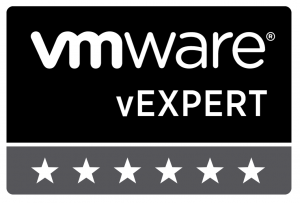What is it?
Xtravirt have very kindly provided a script which connects to VMware and downloads all the latest documentation
http://xtravirt.com/product-information/document-downloader-for-vmware/
Note: This version deletes the .html files so that they can be re-created to ensure new layouts are captured. Also, due to the new format of the VMware website you may receive an ActiveX control prompt. If you do not enable this, then some of the tabs will not work.
GetVMwareDocs is a small DOS batch script that creates and maintains a local copy of all VMware’s product documentation, making it an ideal utility for consultants or administrators that require offline access to these resources, such as when at a customer site without immediate internet access.
In order to control its “reach” and avoid unnecessary downloads, the script follows explicit links from this page. As a result, when the index page changes (typically each time VMware release a new product or a product update), it may require modification to include the new links, so check the Xtravirt website periodically as we will endeavour to maintain an up to date version.
On first use, the total volume of data downloaded will approach 677MB (as at 13 August 2010). It therefore makes sense that if you have already performed a download (even if it is incomplete or out of date) and wish to provide a colleague with the same utility, that you also provide them with your previously downloaded files. Subsequent script executions will refresh this repository, only downloading any “missing” or updated documents.
Once the repository has been built, access to it is via a local copy of the VMware documentation index page, meaning that the offline navigation process is identical to the online one. The script will automatically load the index page into a browser session, whether or not a check for updates is elected to be performed first
Requirements
- Microsoft Windows
- GetVMwareDocs.bat script (download latest version above) from Xtravirt’s site
- wget.exe utility (http://users.ugent.be/~bpuype/wget/)
- Minimum of 800MB free disk space (this requirement will increase over time as VMware publish new documentation)
- Internet access (direct, or via an HTTP proxy)
- .txt files have been associated with a document viewer
- .html files have been associated with a web browser
Installation
- Create a folder to contain the script and the downloaded files (eg. C:\VMwarePDFs).
- Download GetVMwareDocs.bat and put it in C:\VMwarePDFs
- Download the wget utility and put it in C:\VMwarePDFs
Operation
- In Explorer, navigate to and execute GetVMwareDocs.bat. (Note, it is important that the script is executed from the directory it resides in. Additionally, it cannot be executed from a UNC path.)
- If a log file from a previous execution does not exist, a check for updates will be initiated.
- If a log file from a previous execution does exist, you are asked if you wish to check for updates or not.
- If you do not check for updates, the documentation index page is loaded into your default web browser.
- If you check for updates, you are asked for HTTP proxy details.
- Specify your HTTP proxy details in the described format or press Enter if not applicable.
- The update process will start and will take a few minutes to complete, varying according to the capabilities of your Internet connection – activity is reported in the window title bar. The first task performed is to delete any .html files from within the directories to ensure the most current versions are made available. (Note, if the download process is interrupted, the links in the local web pages will not be updated to reference each other properly. If this occurs, simply run the script again, check for updates, and allow the process to compete.)
- The filenames of any updates downloaded are displayed and you are asked to review the log file or not. (Note, only PDF updates are listed.)
- If you review the log file, it is loaded into your default .txt file viewer.
- Whether you review the log file or not, the documentation index page is loaded into your default web browser
Links
The script downloads all the HTML pages and PDF documents referenced on the VMware Documentation pages at http://www.vmware.com/support/pubs/index.html, including those for previous product versions.

